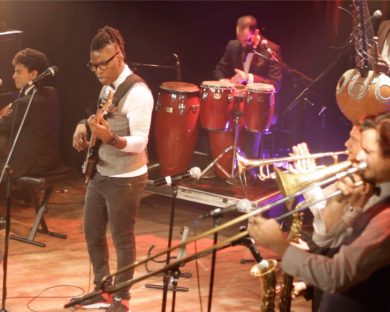According to the old adage, we’re never better served than by ourselves. Two years ago, Montréal singer-songwriter Just Woân (aka Justin Itoko) created his own Productions Miss Meuré label. “I felt that in Quebec, there weren’t enough record labels that were interested in taking artistic risks,” he says. “They prefer remaining in their comfort zones, and always producing the same kind of thing, whereas I wanted to release projects such as Bantü Salsa, to do crazy stuff, and to mix things that didn’t belong together at all!”
Such as bringing the kora and salsa music together, for instance. On paper, the link isn’t obvious. The kora is a classical instrument that’s been played by African griots for the past 800 years or so. Salsa, on the other hand, is an energetic musical style that was born in New York City clubs in the ‘60s, and combines the fluidity of jazz with Afro-Cuban beats. Africa is the common denominator here, but as Woân points out, musically they have nothing to do with each other.
Until you listen to Kessaï, the band’s debut album, released on March 11, 2020. Luminous! Kora tones dancing with pulsating brass and percussion sounds, and, whattaya know, it works! “I thought that using the kora in salsa music was a completely crazy idea, and that’s exactly why I felt like doing it,” says Woân.
That fertile intuition is precisely what has helped him out of his comfort zone – for the umpteenth time. Originally from Cameroun, he’s been a professional stage and studio musician for the past 12-odd years , finding his calling (and stage name) thanks to his participation in a local “talent discovery program” – something like The Voice, et al.
“Cameroun and Canada are the only two English/French bilingual countries in the world,” says Woân. “The national broadcasting entity operates in English and French simultaneously. One day, I was on this program that was being produced by an English-speaking host, and, in the beginning, I used to style my name Just-1 [pronounced “Justin” in French] and the way he read it on air, it sounded like “Just One.” From that day on, everybody was calling me Just One on the street…”
 Woân began his recording career in 2011 and, after being invited to perform as part of the Facncofolies festival, he decided to settle in Montréal. He ended up releasing three more albums featuring his rich Bafia (a major city located in the centre of Cameroun) culture, and kept singing in his Bantu language while exploring African and American rhythms.
Woân began his recording career in 2011 and, after being invited to perform as part of the Facncofolies festival, he decided to settle in Montréal. He ended up releasing three more albums featuring his rich Bafia (a major city located in the centre of Cameroun) culture, and kept singing in his Bantu language while exploring African and American rhythms.
“I’m a multi-instrumentalist, and also self-taught – I never took a music class in my entire life, so I play music by ear,” says Woân. “Bantü Salsa is the type of music I play: I’ve always loved Latin music, particularly when it’s played on the piano, because I play the piano a lot,” besides bass, an instrument with which the musician he often is associated. “I’ve always loved playing octaves with my right hand and slap counterpoints with my left hand, and many jazz musicians have done salsa music, two genres that are harmonic cousins.”
It was quite a natural thing, he says, for Central Africa’s Bantu music to find its way into New York’s salsa music. “There’s a narrative side, the thing that griots bring to their approach, in Bantü Salsa’s music,” he says. “I think that even in the Afro-Cuban culture, there is that kind of a storyline, and that’s how many stories and traditions are being passed on.”
He first decided to build a personal repertoire, which brought him to write all of the first album’s songs by himself – including lyrics, melodies, brass orchestrations, basslines, and percussion. “It’s a project where the fusion is primarily rhythmic; that is to say, what I wanted to show was the similarities between African and Latin beats. The music of Black slaves who were brought from Africa to America was made of rhythms that incorporated the harmonic traditions of Spanish and Portuguese settlers.
“What I wanted to show, on disc and onstage, was that very kinship, and this is the level on which all these talented musicians that surround me have been helping me – first of all, by joining the project from the word go,” he says.
Today, they would have been nine outstanding instrumentalists onstage – if COVID-19 hadn’t interfered with Bantü Salsa’s plans right after the release of the Kessaï album. The band will be performing on Oct. 22, 2020, from the Balattou, and their (virtual) concert will be streamed on Festival international des Nuits d’Afrique.